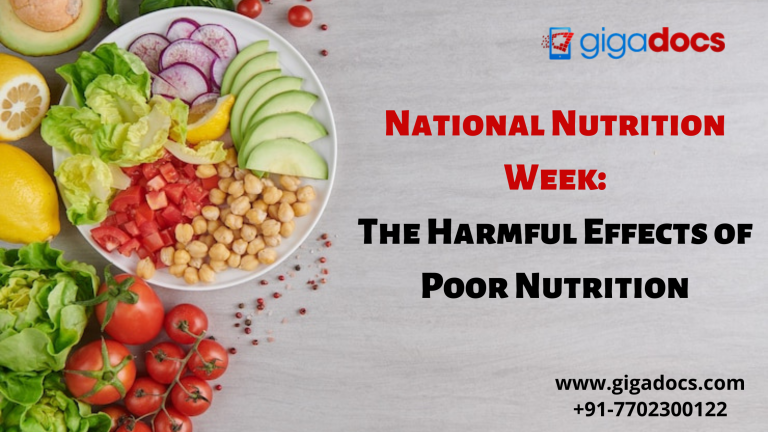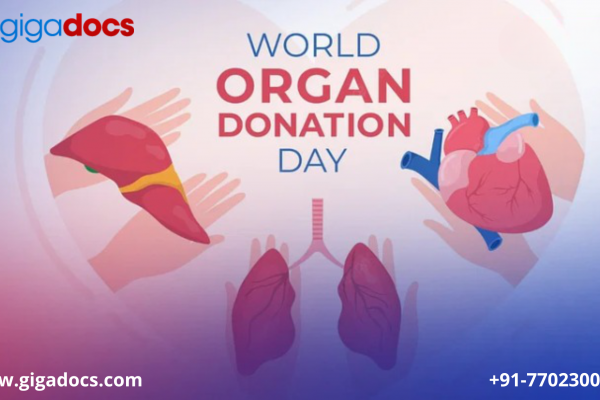Food does more than provide calories and energy to the body. A balanced diet provides the much-needed nutrition that includes vitamins and minerals your body needs for proper functioning. As a result, what we eat directly impacts our overall health. Eating a balanced diet means your organs and bodily systems will work without complaint. On the other hand, poor eating habits make you more likely to develop complications and be susceptible to diseases.
What does healthy well-being mean to you? It brings together a healthy mix of vegetables and fruits that provide immunity against bacterial infections and viruses.
National Nutrition Week
is observed from September 1 to September 7 to emphasize the importance of eating a well-balanced diet. It also highlights the significance of developing a strong immune system. We are all aware of the benefits of a well-balanced diet, but are you aware of the damaging effects of poor nutrition?
The Negative Effects of Poor Nutrition
- Obesity and being overweight
Ever wondered what contributes to obesity in children? Reasons include an unhealthy diet and inadequate sleep. You will be surprised to know that the prevalence of obesity is increasingly rising faster in India than the global average.
For example, among women, being overweight increased from 8.4% to 15.5% between 1998 and 2015, while being obese increased from 2.2% to 5.1% during the same period. Obesity differs according to various factors, including gender, age, socioeconomic status, and geographical environment. It is becoming more common among children aged 2 to 19 years old and sedentary adults, putting them at risk for heart disease, type 2 diabetes, and certain cancers.
- Heart Disease and Stroke
The two leading causes of stroke and heart disease are high cholesterol and blood pressure. In India, the annual deaths from cardiovascular diseases (CVD) are projected to rise from 2.26 million in 1990 to 4.77 million by 2025 calling it one of the highest rates of CVD. Among the causes is excessive sodium consumption, which can drastically increase blood pressure and the risk of stroke and heart disease. Current recommendations call for no more than 2,300 mg per day. With changing lifestyle patterns and eating out becoming the norm, sodium intake increases from packaged, processed, store-bought, and restaurant foods.
- High Blood Pressure/Hypertension
A higher salt intake can have a direct effect on your blood pressure. Hypertension and cardio diseases are directly related; the higher your blood pressure, the greater your chances of developing heart disease. Keep an eye on the salt content of foods, mainly processed foods, and salty snacks.
- Type 2 Diabetes
Overweight or obese people are more likely to develop type 2 diabetes than healthy-weight people because their bodies become less able to use the insulin they produce over time. India is the world’s diabetes capital, with the highest rate of increase in recent years. The most common type of diabetes is type 2 diabetes mellitus. Type 2 diabetes mellitus affects 2.4% rural and 11.6% of urban residents.
- Cancer
An unhealthy diet can exacerbate some cancers; for instance, consuming unhealthy foods and beverages, such as sugar-sweetened beverages and highly processed foods, can result in weight gain, obesity, and other chronic conditions. That increases the risk of at least 13 types, including endometrial (uterine) cancer, breast cancer in postmenopausal women, and colorectal cancer. According to cancer registry data, it is estimated that approximately 800,000 new cancer cases will be diagnosed in India each year. The load is likely three times that of 240,000 cases at any given time. Tobacco use is linked to 35 to 50% of all cancers in men and about 17% of cancers in women.
A high-fiber diet lowers blood cholesterol levels, lowering your risk of developing various types of cancer. Dietary fiber also makes you feel full, which helps you avoid overeating. Fiber also promotes proper metabolism and digestion, lowering the risk of cancer.
What role does a well-balanced diet play in disease prevention?
To prevent the onset of these diseases, we must understand how multiple nutrients in a diet interact and affect the functions of the human body.
A variety of factors can contribute to the development of heart disease, say, researchers. These risk factors include insulin resistance, elevated homocysteine, inflammation, oxidative stress, elevated cholesterol, hypertension, and heavy metal toxicity. Nutrition can influence all of these factors, affecting our nutritional requirements. A study, for example, demonstrates the significance of optimal mineral balance and how a lack of mineral balance can contribute to the development of congestive heart failure.
Mindful Eating as a Practice
Mindful eating is based on the Buddhist concept of mindfulness. It treats various conditions such as eating disorders, depression, anxiety, and food-related behaviors. It is a technique for gaining control of your eating habits and can help you reduce binge eating, lose weight, and feel better.
Fundamentally, mindful eating entails:
- distinguishing between true hunger and non-hunger eating triggers,
- listening to physical hunger cues;
- eating slowly and without distraction;
- eating only until full.
Mindful eating involves using your senses to detect colors, smells, sounds, textures, and flavors. It aims to recognize the effects food has on your feelings, appreciate your food, and learn to cope with guilt and anxiety about food and eating to maintain overall health and well-being.
What are the benefits of Mindful Eating?
An abundance of food options lures people in today’s fast-paced culture. Furthermore, distractions have shifted focus away from the act of eating and toward smartphones, televisions, and computers. Eating has devolved into a mindless activity aimed at a fast pace, which can be difficult because it can take your brain up to 20 minutes to realize you’re full. And by that time, you have already overeaten, which is quite common among binge eating.
Eating mindfully allows you to refocus your attention and slow down, making eating an act rather than a chore. Furthermore, mindful eating improves your recognition of physical hunger and fullness cues. In the long run, you can differentiate between emotional and true physical hunger.
What role does nutrition play in weight loss?
Did you know that?
Approximately 85% of obese people who lose weight return to or exceed their initial weight within a few years.
Eating disorders lead to weight gain, with one study revealing that nearly 70% of people suffering from binge eating disorders are obese. Weight regain after successful weight loss links binge eating and emotional eating. In addition, chronic stress may also play a significant role in overeating and obesity. Most studies agree that mindful eating aids weight loss by altering eating habits, making people more aware, and improving self-control, about the way they perceive food.
Happy National Nutrition Week from Gigadocs! Download the Gigadocs app to schedule an appointment with the best dietitians for your health and well-being.
Download the Gigadocs App from-
- IOS App – apple.co/2W2iG4V
- Android App – bit.ly/33AQoR




